Analysis - In Sharp Switch, Australia Votes For Climate Action

Australia's election has brought in a wave of Greens and independents pushing for aggressive targets to cut carbon emissions, who will pressure the incoming Labor government to step up its climate plans if it wants to pass any legislation.
The country's biggest polluters in mining, oil and gas and building materials face a gradual tightening of allowed carbon emissions, while Labor aims to boost demand for electric vehicles and speed up renewable energy developments.
The election result, with the pivotal role climate change played, represents a remarkable shift for Australia, one of the world's biggest per capita carbon emitters and top coal and gas exporters. It was shunned at last year's Glasgow climate summit for failing to match other rich nations' ambitious targets.
"Together we can end the climate wars," incoming Prime Minister Anthony Albanese said in his victory speech. "Together we can take advantage of the opportunity for Australia to be a renewable energy superpower."
Albanese has said Labor would maintain its target of cutting carbon emissions 43% from 2005 levels by 2030, already much tougher than the outgoing conservative government's Paris target of a cut of up to 28%.
With votes still being counted, Labor is short of a majority in the lower house of parliament, so may need the support of an expanded cross-bench. Even with an outright majority, it could face a fight in the Senate, where it will likely to need to work with the Greens to pass legislation, including the 2030 emissions target.
"Now the battle will be over ambition in short-term targets, legislating a plan so it's out of the hands of any one government, and hitting pause on new fossil fuel mines," said Richie Merzian, climate and energy head at the Australia Institute think tank.
The Greens want to achieve net zero by 2035 rather than 2050, stop new coal and gas infrastructure being built, and end coal-fired generation by 2030.
Labor will also face pressure from a handful of climate-focussed independents pushing for emissions reductions of at least 50% by 2030.
FOSSIL FUEL JOBS
Defeated Prime Minister Scott Morrison once mocked Labor, brandishing a lump of coal in parliament saying, "Don't be afraid."
Since then, Labor - conscious of its defeat in 2019 when it lost seats in regions reliant on coal and gas jobs - has dropped or diluted policies that could hurt them.
Two days ahead of the election, a senior Labor politician heaped praise on the gas industry for building mega-projects that generate massive exports, forecast to reap A$70 billion ($50 billion) this year.
"I want to be clear how enthusiastic I am, but also how enthusiastic Labor is for this industry, because we know that it creates jobs and creates livelihoods," Labor's shadow minister for resources, Madeleine King, told a petroleum conference.
Labor's key climate policies are to boost demand for electric vehicles through tax breaks, provide A$20 billion in cheap finance to build transmission for new renewable energy projects and tighten the country's emissions "safeguard mechanism".
That mechanism sets a baseline of allowable emissions on the 215 big mining, energy and materials companies that emit more than 100,000 tonnes a year of carbon dioxide equivalent.
Companies are awaiting details on the plan, which envisions ratcheting down the baselines to get to net zero by 2050, but are largely unfazed by the proposal.
"At a big-picture level, it's probably not going to feel very different from commitments we've already made," Meg O'Neill, chief executive of gas producer Woodside Petroleum, told reporters this week.
Cost challenges could hamper Labor's push to achieve 82% renewable energy by 2030, with the rising cost of materials used in power lines, solar and wind farms. At the same time power prices are set to soar, mostly due to high global coal and gas prices.
"The next couple of years look awful for energy users, and whoever's in government will be under pressure over that," said Tennant Reed, climate and energy policy head at Australian Industry Group.
($1 = 1.4219 Australian dollars)
© Copyright Thomson Reuters 2024. All rights reserved.





















